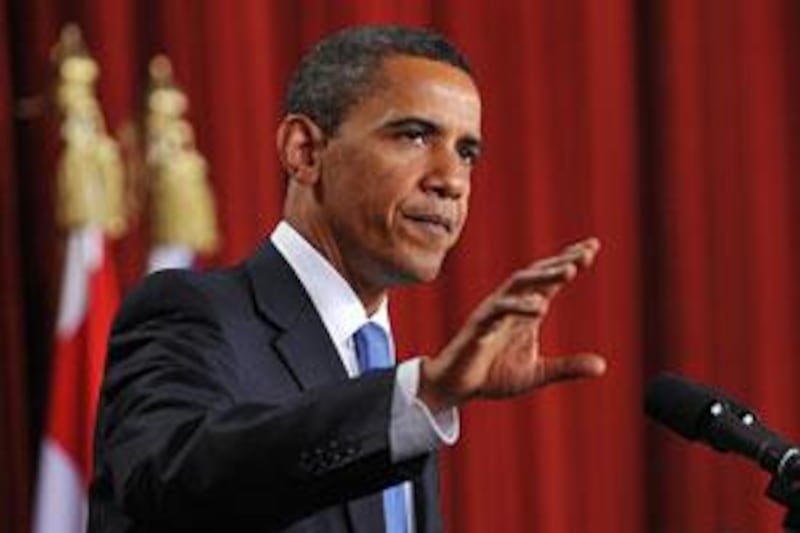US President Barack Obama has vowed to forge a "new beginning" for Islam and America in a landmark speech to the world's Muslims, evoking a vision of peace after a smouldering cycle of "suspicion and discord." In what may be a defining moment of his presidency, Mr Obama laid out a new blueprint for US Middle East policy, vowing to end mistrust, forge a state for Palestinians and defuse a nuclear showdown with Iran.
"So long as our relationship is defined by our differences, we will empower those who sow hatred rather than peace," said Mr Obama, who was greeted with a standing ovation as he stepped up to the podium at Cairo University. Mr Obama's long-awaited speech fulfilled a campaign promise and came after he held talks in Saudi Arabia on Wednesday with King Abdullah and today with the Egyptian president Hosni Mubarak aimed at reviving Middle East peace moves.
In the university's imposing domed Great Hall, Mr Obama said the US bond with Israel, the source of much Arab distrust of the United States, was unbreakable, and rejected "ignorant" rants by those who deny the Nazi Holocaust. But, breaking from policies of his predecessor George W. Bush, Mr Obama also rebuked the prime minister Benjamin Netanyahu's refusal to halt West Bank settlement expansion and reiterated his backing for a two-state solution.
"I have come here to Cairo to seek a new beginning between the United States and Muslims around the world," Mr Obama said in a speech targeting the globe's 1.5 billion Muslims on television, the Internet and on social networking sites. "This cycle of suspicion and discord must end," said Mr Obama vowing to fight "negative stereotypes of Islam wherever they appear". "But that same principle must apply to Muslim perceptions of America," he said, and touched on contentious regional issues such as democracy and women's rights.
Quoting the region's three holy books, the Qoran, the Torah and the Bible, he evoked a future of "mutual interest and mutual respect, examing all sources of tension between America and the Muslim world. The US president, laying out an ambitious foreign policy, to match the audacity of his domestic program, spoke directly to Muslims on their arguments with America. In so doing, he was attempting to cleanse the soiled US image in the Muslim world, including in over the Iraq war, the Abu Ghraib abuse scandal and the Guantanamo Bay war on terror camp. Specifically targeting young Muslims, Mr Obama said "I know there are many -- Muslim and non Muslim -- who question whether we can forge this new beginning." "Some are eager to stoke the flames of division, and to stand in the way of progress. Some suggest that it isn't worth the effort -- that we are fated to disagree, and civilizations are doomed to clash. "There is so much fear, so much mistrust. But if we choose to be bound by the past, we will never move forward." Mr Obama called on Israelis and Palestinians to revive stalled peace talks, demanding Palestinians halt violence and Israelis to ease the plight of those in the occupied territories. "Too many tears have been shed. Too much blood has been shed." "America will not turn our backs on the legitimate Palestinian aspiration for dignity, opportunity, and a state of their own," Mr Obama said, calling on both sides to live up to obligations under the stalled "roadmap" for Middle East peace. "The United States does not accept the legitimacy of continued Israeli settlements. This construction violates previous agreements and undermines efforts to achieve peace. It is time for these settlements to stop." The US president also renewed his offer for dialogue "without preconditions" with arch-US foe Iran, over, after a decades-long Cold War style conflict. "It will be hard to overcome decades of mistrust, but we will proceed with courage, rectitude and resolve," Mr Obama said. "It is clear to all concerned that when it comes to nuclear weapons, we have reached a decisive point," he said warning a regional arms race would be a "hugely dangerous path" but saying Iran had the right to nuclear peaceful power. Mr Obama also weaved his own biography, with Islamic lineage among family members in Kenya, and several years growing up as a boy in Indonesia, into his search to pick out a new path for the United States and Islam. And in his own warning to the Muslim world, Mr Obama said United States would "never tolerate" violence, citing the trauma of the September 11 attacks in 2001, though saying his country lost its way with harsh war on terror tactics. * AFP





